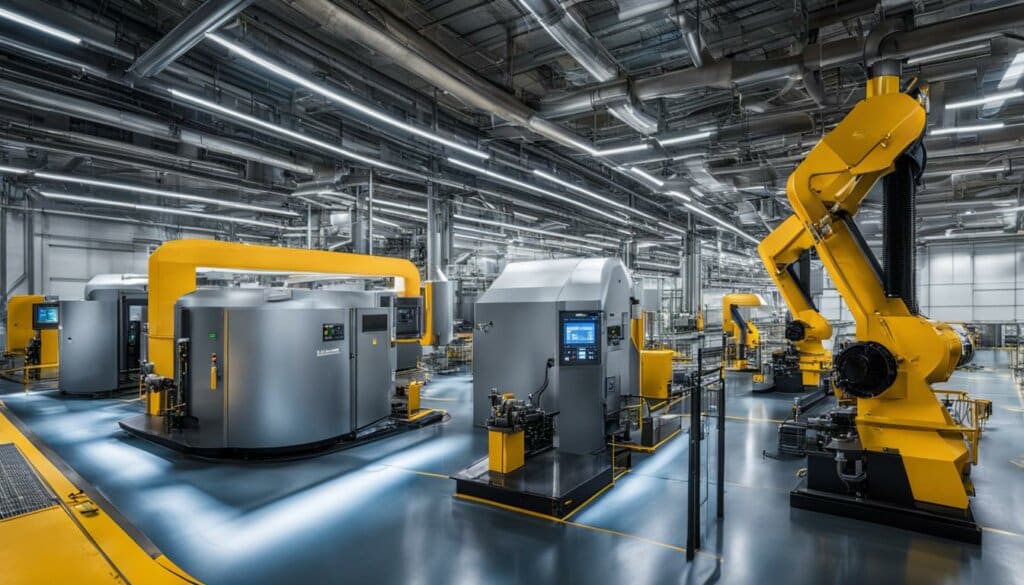Table of Contents
Intel and Siemens have announced a three-year partnership to enhance factory efficiency, with a specific focus on improving energy efficiency and sustainability. This collaboration aims to deepen Siemens’ understanding of advanced chipmaking processes and transfer that knowledge to other industries.
The Intel-Siemens partnership brings together their expertise in manufacturing and technology to drive manufacturing improvement and energy-saving solutions. By leveraging smart manufacturing technologies and industrial automation, this collaboration has the potential to revolutionize manufacturing processes and set new standards for energy efficiency.
The Importance of Energy Efficiency in Manufacturing
Energy efficiency plays a critical role in the manufacturing industry, benefiting both businesses and the environment. By prioritizing energy efficiency, companies can optimize their operations, reduce costs, and contribute to a more sustainable future. In an era where environmental concerns are at the forefront, manufacturing efficiency and sustainable practices have become increasingly important.
One of the key advantages of improving energy efficiency in manufacturing processes is the potential for significant cost savings. By identifying and implementing energy-saving measures, companies can reduce their energy consumption and lower their utility bills. This not only improves their bottom line but also enhances their competitiveness in the market. Additionally, energy-efficient manufacturing processes often result in reduced waste and improved resource utilization, further contributing to cost savings.
Furthermore, sustainable manufacturing practices have a positive impact on the environment. By reducing energy consumption, manufacturing facilities can decrease their carbon footprint and minimize their impact on climate change. This aligns with global efforts to combat environmental degradation and supports the transition towards a greener economy. Emphasizing energy efficiency and sustainable manufacturing practices also helps companies meet regulatory requirements and adhere to industry standards.
Benefits of the Intel-Siemens Partnership
The partnership between Intel and Siemens brings together their expertise in manufacturing and technology. By leveraging their combined knowledge, the collaboration aims to drive manufacturing improvement through the development and implementation of energy-saving solutions. The use of smart manufacturing technologies and industrial automation will play a significant role in achieving these goals. The Intel-Siemens partnership has the potential to revolutionize manufacturing processes and set new standards for energy efficiency.
The Power of Manufacturing Improvement
One of the key benefits of the Intel-Siemens partnership is the focus on manufacturing improvement. By combining Intel’s expertise in chip technology with Siemens’ knowledge of factory automation, the collaboration aims to optimize manufacturing processes and enhance overall efficiency. This will result in faster production cycles, reduced costs, and improved product quality.
Energy Saving Solutions for a Sustainable Future
Energy efficiency is a critical aspect of sustainable manufacturing. The Intel-Siemens partnership recognizes this and aims to develop and implement energy-saving solutions. By leveraging smart manufacturing technologies and industrial automation, the collaboration seeks to reduce energy consumption and minimize environmental impact. This not only benefits the companies involved but also contributes to a more sustainable future for the manufacturing industry as a whole.
Driving Innovation in Smart Manufacturing
The Intel-Siemens partnership has the potential to drive innovation in smart manufacturing. Through the utilization of advanced technologies and automation systems, the collaboration aims to streamline production processes and improve productivity. By harnessing the power of data and analytics, the partnership can optimize operations, identify areas for improvement, and drive continuous innovation in the manufacturing industry.
| Benefits of the Intel-Siemens Partnership |
|---|
| Manufacturing Improvement |
| Energy Saving Solutions |
| Smart Manufacturing Innovation |
The Role of Extreme Ultraviolet (EUV) Lithography
The collaboration between Intel and Siemens extends to the cutting-edge technology of extreme ultraviolet (EUV) lithography. This advanced chip manufacturing process plays a crucial role in Intel’s transition to more efficient chip technology. With EUV lithography, Intel can achieve greater precision and complexity in chip production, enabling the development of faster and more powerful devices.
EUV lithography utilizes extreme ultraviolet light with a wavelength of just 13.5 nanometers, allowing for the creation of incredibly detailed semiconductor patterns. By using this technology, Intel can manufacture chips with smaller feature sizes, ensuring higher performance and energy efficiency. The integration of EUV lithography in Intel’s manufacturing processes aligns with their commitment to enhancing energy efficiency and sustainability.
This collaboration also benefits Siemens, as it provides an opportunity for the company to gain a deeper understanding of EUV lithography and its application in chip manufacturing. By leveraging Intel’s expertise, Siemens can expand its knowledge base and use this technology to drive innovation in other industries. This cross-industry knowledge transfer is essential for the advancement of manufacturing processes as a whole.
Siemens’ Track Record in Collaborations
Siemens has a proven history of successful collaborations with leading manufacturers, showcasing their expertise in partnering to drive innovation and operational changes. A notable example is their partnership with Mercedes-Benz, where Siemens supported the automaker’s transition from traditional combustion engines to manufacturing electric vehicles.
The Siemens-Mercedes-Benz collaboration focused on leveraging Siemens’ advanced manufacturing technologies and expertise in electric vehicle production to streamline processes and ensure the successful integration of electric vehicle components. Siemens played a vital role in optimizing manufacturing efficiency, ensuring the highest quality standards, and supporting the seamless production of electric vehicles.
This partnership demonstrated Siemens’ ability to assist companies in adopting new technologies and making significant operational changes. By leveraging their expertise and experience, Siemens enabled Mercedes-Benz to successfully navigate the challenges of transitioning to electric vehicle manufacturing, positioning them as a key player in the electric vehicle market.
| Collaboration | Industry | Key Achievements |
|---|---|---|
| Siemens-Mercedes-Benz Partnership | Automotive | Smooth transition to electric vehicle manufacturing, optimization of manufacturing efficiency, and ensuring highest quality standards. |
Siemens’ collaboration with Mercedes-Benz showcased their expertise in assisting companies in adopting new technologies and making significant operational changes.
Key Takeaways: Siemens’ Collaborations
- Siemens has a track record of successful collaborations with leading manufacturers.
- They have demonstrated expertise in supporting companies’ transition to new technologies and making operational changes.
- The Siemens-Mercedes-Benz partnership was focused on streamlining electric vehicle manufacturing processes.
- Siemens played a vital role in optimizing manufacturing efficiency and ensuring the highest quality standards.
- This collaboration positioned Mercedes-Benz as a key player in the electric vehicle market.
The Siemens-Mercedes-Benz partnership showcases Siemens’ ability to drive innovation, optimize manufacturing efficiency, and support companies in adopting new technologies. This track record positions Siemens as a trusted partner for manufacturers seeking to implement cutting-edge solutions and achieve operational excellence.
The Impact on Industry Standards
The collaboration between Intel and Siemens has the potential to reshape industry standards for manufacturing and energy efficiency. By combining their expertise and focusing on sustainable manufacturing practices, they aim to set new benchmarks for efficiency in the industry.
One key area that will be influenced by this partnership is manufacturing efficiency. Through their collaboration, Intel and Siemens will develop innovative solutions to optimize manufacturing processes, reduce waste, and improve overall productivity. By implementing these solutions, other companies in the industry can learn from their success and adopt similar strategies, ultimately driving the entire manufacturing sector towards greater efficiency.
Energy efficiency standards will also be significantly impacted by the Intel-Siemens partnership. With a shared commitment to sustainability, the two companies will work together to develop and promote energy-saving initiatives within the manufacturing industry. By establishing new standards for energy efficiency, they will not only reduce the environmental footprint of manufacturing operations but also create cost savings for businesses.

The partnership between Intel and Siemens represents a powerful collaboration that will redefine industry standards for manufacturing efficiency and energy sustainability. By leveraging their expertise and resources, they have the potential to transform the way manufacturing processes are conducted, setting new benchmarks for excellence. As other companies in the industry adopt similar practices, the impact of this partnership will ripple through the entire manufacturing sector, driving it towards a more sustainable and efficient future.
Conclusion
The collaboration between Intel and Siemens signifies a significant milestone in the pursuit of enhancing manufacturing efficiency and promoting sustainable practices. By combining their resources and expertise, these influential technology giants are striving to drive innovation and improve energy efficiency within the industry. This partnership holds the potential to revolutionize manufacturing, establishing new benchmarks for excellence.
Through a focused approach on energy efficiency and resource optimization, Intel and Siemens are leading the way towards a greener and more efficient future in manufacturing. By leveraging their vast knowledge and capabilities, they aim to establish new standards that prioritize sustainability and propel the industry forward.
With a shared commitment to excellence, Intel and Siemens are well-positioned to set a precedent for manufacturing efficiency and energy sustainability. By pooling their efforts, these tech giants are paving the way for a brighter and more sustainable future in manufacturing, where innovation and environmental consciousness go hand in hand.
FAQ
What is the collaboration between Intel and Siemens?
The collaboration between Intel and Siemens is a three-year deal aimed at improving factory efficiency and automation, with a special focus on enhancing energy efficiency and sustainability.
Why is energy efficiency important in manufacturing?
Energy efficiency is crucial in manufacturing as it helps reduce environmental impact and leads to significant cost savings. It optimizes resource utilization and reduces waste.
What are the benefits of the Intel-Siemens partnership?
The partnership aims to drive manufacturing improvement through the development and implementation of energy-saving solutions. It leverages smart manufacturing technologies and industrial automation.
What is the role of Extreme Ultraviolet (EUV) lithography?
Extreme Ultraviolet (EUV) lithography is a cutting-edge chip manufacturing technology that Intel is transitioning to. It is energy-intensive but crucial for advanced chipmaking.
What is Siemens’ track record in collaborations?
Siemens has a history of successful collaborations with large manufacturers, such as Mercedes-Benz in their transition to electric vehicle manufacturing. They have expertise in assisting companies in adopting new technologies and making operational changes.
What impact will the collaboration have on industry standards?
The collaboration between Intel and Siemens has the potential to reshape industry standards for manufacturing and energy efficiency. They aim to set new benchmarks for efficiency and promote sustainable manufacturing practices.
What is the conclusion of the collaboration between Intel and Siemens?
The collaboration between Intel and Siemens represents a significant step towards improving manufacturing efficiency and energy sustainability. By pooling their resources and expertise, these tech giants aim to drive innovation, enhance energy efficiency, and promote sustainable manufacturing practices.













